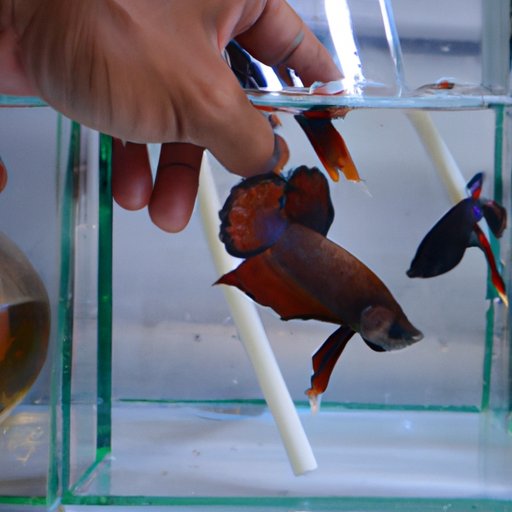Introduction
Betta fish, or Siamese fighting fish, are popular aquarium fish known for their vibrant colors and graceful fins. While they are relatively easy to care for, betta fish require specific conditions in order to thrive. This guide will provide an overview of betta fish care, including creating a healthy tank environment, feeding the right diet, providing regular cleanings and maintenance, monitoring health regularly, and handling your betta fish properly.

Creating a Healthy Tank Environment for Your Betta Fish
The first step in caring for your betta fish is to create a healthy tank environment. Bettas are tropical freshwater fish and prefer warm temperatures, so it’s important to choose a tank heater that will maintain a temperature of 76-80°F (24-27°C). It’s also important to select a filter that is designed for betta tanks, as powerful filters can be too strong for betta fish.
Setting Up the Tank
When setting up the tank, use a substrate such as gravel or sand to cover the bottom. Make sure to rinse the substrate before adding it to the tank, as particles can cloud the water. Decorations such as rocks, driftwood, and artificial plants can also be added, but avoid sharp edges and decorations that are too large for your betta to swim through. It’s also important to make sure all decorations are free of toxins and chemicals.
Maintaining Water Quality
Maintaining good water quality is essential for betta fish health. Test the water regularly for ammonia, nitrite, and nitrate levels, and perform weekly water changes of 25-50% of the tank volume. Use a dechlorinator when changing the water, as chlorine from tap water can be harmful to fish. Additionally, make sure to use a water conditioner when adding new water to the tank.
Adding Live Plants
Live plants can help create a more natural environment for your betta fish and also provide them with places to hide. Choose hardy plants such as Java fern and Anubias that can tolerate a wide range of water conditions. When adding plants to the tank, make sure to rinse them thoroughly to remove any dirt or debris.

Feeding Your Betta Fish the Right Diet
A healthy diet is essential for betta fish health. Bettas are omnivores, so they should be fed a variety of foods including pellets, flakes, frozen or freeze-dried food, and live food such as brine shrimp and bloodworms.
Types of Food
When selecting food for your betta, look for high-quality products that contain a variety of ingredients. Avoid foods that contain fillers such as corn or wheat, as these can be difficult for bettas to digest. Additionally, make sure to read the label and avoid foods that contain artificial colors or preservatives.
Feeding Frequency
Bettas should be fed two or three times a day, in small amounts. Overfeeding can lead to digestive problems and uneaten food can pollute the tank, so it’s important to only feed as much as your betta can consume in a few minutes.
Providing Regular Cleanings and Maintenance
In order to keep your betta fish healthy, it’s important to provide regular cleanings and maintenance. This includes weekly water changes, replacing filter media, and removing algae.
Water Changes
It’s important to change 25-50% of the tank water on a weekly basis. When performing a water change, make sure to use a dechlorinator and water conditioner to remove any toxins or chemicals from the tap water. Additionally, make sure to rinse the substrate before adding it back to the tank.
Replacing Filter Media
It’s important to replace filter media on a regular basis, as it can become clogged with debris over time. Replace filter media at least once a month, or more often if needed.
Removing Algae
Algae can quickly take over a tank, so it’s important to remove it regularly. Scrub the walls of the tank with an algae scraper and vacuum the substrate to remove any excess algae.

Monitoring Betta Fish Health Regularly
It’s important to monitor your betta fish’s health regularly. Look for signs of illness such as white spots, red streaks, cloudy eyes, frayed fins, and lethargy. If you notice any of these signs, contact your veterinarian for advice.
Handling Your Betta Fish Properly
Betta fish should be handled gently and carefully. Before picking up your betta, make sure your hands are wet and warm, as cold hands can shock the fish. When picking up your betta, support its body with one hand and use your other hand to gently scoop it up. Avoid squeezing or gripping the fish, as this can cause injury.
Conclusion
Caring for a betta fish requires patience and dedication. With proper care, your betta fish can live a long and healthy life. By following the tips outlined in this guide, you can ensure your betta fish has the best possible environment to thrive.


